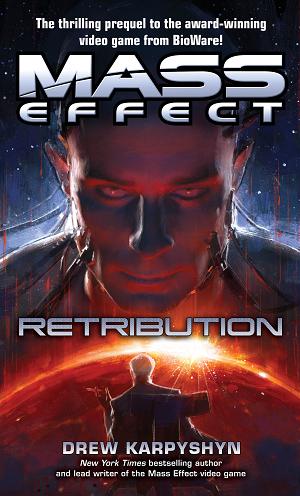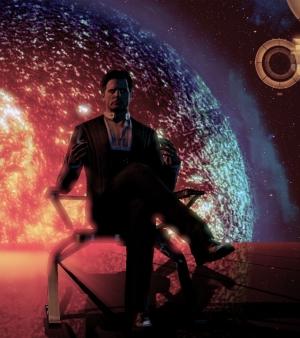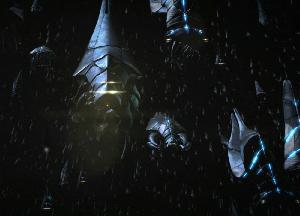Book Review: Mass Effect: Retribution
 | | Mass Effect: Retribution |
[WARNING: There are minor spoilers in this review.]
Of course the Illusive Man wasn't just going to let it go. When Shepard destroyed the Collector ship, he may have destroyed a lot of valuable information about the Reapers, but Cerberus is powerful enough to find other ways to study them, to understand the enemies' motives as they wait in dark space and plot to destroy all organic life. That's why Cerberus kidnaps former operative Paul Grayson and implants him with unpredictable Reaper technology. Little does the Illusive Man know, Paul sent out a warning to Kahlee Sanders, who has recruited the help of Admiral David Anderson to strike at Cerberus once and for all. As Paul becomes repurposed into something inhuman and impossibly powerful, the Cerberus station holding him is attacked, giving the Reapers a chance to unleash their new avatar on an unsuspecting galaxy.
This is Mass Effect: Retribution, the third novel set in the universe of the Mass Effect video games. Those who read Mass Effect: Revelation and Mass Effect: Ascension (or at least my reviews of them) know what to expect: a story only tangentally related to that of Commander Shepard that purports to put the pieces in place for the next entry in the video game series. However, while that might still be true here, Retribution seems more like a conclusion to the characters introduced in the previous books--especially Kahlee Sanders and Paul Grayson--than a set-up for the third game.
Though there are passing hints that the Reapers motives aren't as simple as we've been lead to believe, there aren't any new ideas, settings, or concepts introduced that could pave the way for the next story. As the story takes us to familiar locations like Omega and the Citadel and centers on characters like the Illusive Man, Aria, and Admiral Anderson, this book feels more connected to the games than either of the previous ones. In many ways, even though Commander Shepard and his exploits are only referenced two or three times, Retribution feels more like an extended epilogue for Mass Effect 2 than anything else. While fans of the Mass Effect series will be pleased to have so many familiar people and places come to life, they could also be annoyed that the story doesn't show us anything fresh.
 | | Every time Anderson has a line of dialogue, this is the man whose omnipresent voice you should hear |
Even the transformation of Grayson, which is one of the novel's greatest strengths, isn't really anything new to us. It does offer insight into what happened with Saren way back before the events of the original Mass Effect, but this sort of transformation has happened before and we largely know what to expect. Still, reading about the transformation from the point of view of the victim is pretty fascinating. The Reapers exert multiple layers of control over Paul, layers that grow and expand as his cybernetic gifts dig deeper and deeper into his body and mind. The way the novel explores Paul's thoughts is incredibly well-done, and gives the reader a clear picture as to how the Reapers gather information and use it to their advantage. Even when he fights their influence, they tend to win, and they learn from their failures every single time. There are even passages that refer back to Saren, like when Paul thinks it strange that the Reapers are so familiar with turian technology or how they have safeguards in place that prevent their avatar from being able to commit suicide.
 | | Martin Sheen--I mean, The Illusive Man--plays a large role in Retribution |
It's easy to see that Drew Karpyshyn has grown as a writer since the first installment (though he has written other novels besides the Mass Effect books). His characters in Retribution are stronger and more nuanced than the characters in Ascension, his exposition is tighter and more interesting, and his numerous action scenes (which are more evenly spaced out in Retribution than they are in Ascension) are as perfect as ever. In terms of sheer writing, Retribution is the best of the bunch. However, I would be remiss if I didn't mention the rather frequent typos. It's more a comment on the editors and publishers than the writer, but still, there are far too many and they can get distracting. I know it sounds like nitpicking, but honestly, there are a lot of typos. Perhaps Karpyshyn needs to hire a better proofreader before he publishes his next novel.
Unfortunately, I have to return to my main complaint: there isn't anything new here. Revelation brought the entire Mass Effect universe to an audience for the first time, and even has plenty of elements that would be new for someone who played the game(s) first. Ascension introduces the Illusive Man, the Collectors, and Omega, three great concepts that are central to the second game. However, Retribution has nothing like that. Aside from a small research station, there are absolutely no new locations. There are no new aliens or concepts explored, and there isn't even anything that delves deeper into an old idea, like the scenes in the quarian migrant fleet in Ascension. In short, the story of Retribution, while entertaining, feels ultimately irrelevant.
 | | The true, unseen antagonists are coming, and their dominion is inevitable |
On top of that, Karpyshyn shoe-horns in the love story between Anderson and Kahlee that he started in Revelation. While this plot thread certainly needed to be resolved, the development of their relationship happens at the oddest moments in the narrative. This almost always feels jarring, and it represents what could be Karpyshyn's biggest flaw as a writer. He does a good job with relationships that don't get traditionally romantic, like the one between Kahlee and Paul or the one between Paul and his daughter, et cetera. However, when he tries to play matchmaker, it never feels as genuine. While there is chemistry between the characters of Anderson and Kahlee, their relationship is never explored in an organic, logical way.
Still, the book is, at its heart, pulp fiction. And if you just want escapist entertainment that happens to take place in the Mass Effect universe, Retribution fits the bill. While the writing is superior to the previous books and the stakes are at their highest, the story lacks a sense of wonder and discovery. It's nice to get a conclusion to Kahlee's story and it's always fun to explore familiar characters like the Illusive Man and Aria, but if you go into this book hoping for big hints about what's to come, you will be disappointed.
FINAL SCORE:





Though well-written, intense, and entertaining, Retribution is the least satisfying of the Mass Effect books to date.
|
-e. magill 11/9/2010
|
|